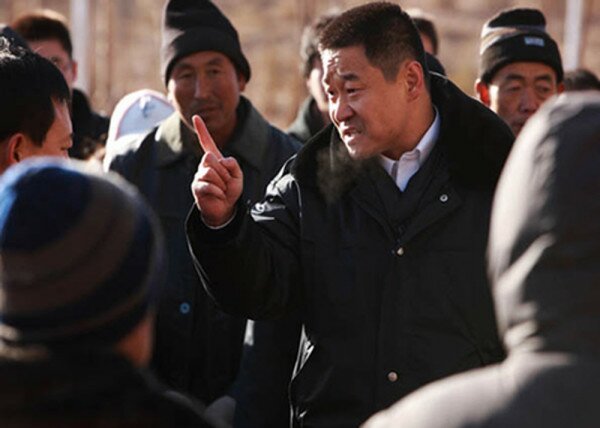It’s well known that China’s spectacular transformation, from economic stagnation to explosive capitalistic prosperity has brought with it a fair degree of corruption and social tension. In many places government officials and the police have come to be known as corrupt; sometimes on a spectacular scale.
This recent history comes to life while watching To Live And Die In Ordos, the story of Hao Wanzhong (Wang Jingchun), an honest and hardworking police officer in the city of Ordos (formerly Dongsheng) in Inner Mongolia.
However, from Wanzhong’s almost comically earnest beginnings as a detective to his meteoric rise through the police ranks and his moving funeral which opens the film something about To Live And Die In Ordos feels improbable. At times, if it were not for one important point, you might start to wonder if you are watching an exquisitely shot piece of state-sponsored propaganda.
The important point is, of course, this is based on a true story.
Hao Wanzhong was apparently an exemplary police officer. That we meet his story with such a degree of skepticism says something about our own cynical frame of mind. The film is told, for the most part, from the perspective of Hua Wei (Sun Liang), a journalist who initially declined to write Wanzhong’s story, because his assumption that all heroes in modern China turn out to be corrupt when closely examined.
However, Wanzhong looks more like a saint and apart from one small (and in the context of the film, rather bizarre) outburst, about wanting to throw journalists in jail, he receives glowing, largely uncritical reviews from colleagues.
But, when saints are canonised, their stories often begin to serve a different function. Biography becomes a tool in the service of ideology; be it religious or political. Maybe, if Wanzhong did not exist, it would have necessary to invent Wanzhong?
The only weakness we are allowed to see is Wanzhong’s failure as a husband and father. Chen Weihan brings a lot of energy to the role of Wanzhong’s increasingly estranged wife Meng Wenjuan. But, something is missing in this part of the story and idealistic devotion to fighting crime doesn’t ring true as a sufficient reason for Wanzhong to skip visiting his wife and young child for months at a time.
Wanzhong might well have been the wonderfully focussed police officer we meet in this film. But, without a deeper sense of his inner world, or a richer understanding of the social issues at play in this region of China, we simply cannot judge his actions. We are cajoled into accepting he is a saint without being able to taste the salt of his miracles.
Ordos City is in one of the wealthiest parts of China, an area rich in minerals and littered with newly minted billionaires. But, it is also a spectacular piece of failed urban planning, with much of the city replete with empty houses and offices that might never be filled. When Wanzhong first intervenes in an industrial dispute, we feel he is doing something good, standing up for the little guy, which in this case means mistreated and unpaid migrant workers.
But, a later, much bigger intervention, which we are told was a stand against organised crime infiltrating union ranks feels hollow. Since the plot fails to give us much context, we struggle again with cynicism, is this really the way it was, or are we getting an “official” spin on the story.
Sadly, To Live And Die In Ordos feels like propaganda, even if it isn’t.
All of which is a shame, because To Live And Die In Ordos could have been a telling film. But, the lack of any critical perspective, or more glimpses into Wanzhong’s inner world undermine the potential power of this story to shake us from our collective cynicism.
